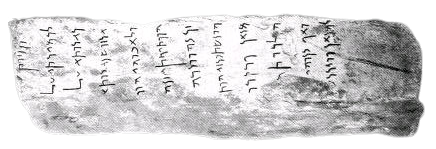 |
| two reconstructed versions of the beginning of Lord's prayer in Galilean |
You heard me.There is no such thing as the Lord's Prayer in Galilean Aramaic-the language that Jesus Christ spoke the most.Not in the original form anyway.Only reconstructions of it exist.Let me elaborate on this.
No text has ever been found with the Lord's Prayer in the Galilean dialect.The oldest known form of the prayer is in Greek from the Gospels of Luke and Mark.The prayer is not found in Matthews's Gospel.The only attested form of the prayer in Aramaic is that of the Peshitta in Syriac Aramaic which is a translation of the original Greek text.
Furthermore the whole dialect itself Galilean Aramaic remains obscure and very scarcely attested. Currently it is being reconstructed and revised all the time.
We know very little of this dialect .Let alone a prayer in it.
What it does exist are reconstructions of the prayer in Galilean Aramaic like this and this and this.Some of these are based on science like linguistics (phonology,dialectology) and history .
Others on the imagination of the author who sometimes mixes both science and fiction to come up with an 'original' Lord's prayer in Galilean.
Over the internet the most popular version is the Lord's prayer in Syriac Aramaic either romanized or in the Syriac script (Estrangelo mainly).
The Syriac Lord's Prayer is sometimes written in fonts like the Herodian script -used for Aramaic in the times of Jesus in Palestine- to make it look Galilean.
Reconctructions of the prayer in Galilean Aramaic are rather scarce.
The single fact remains that since the Lord's Prayer is not attested in Galilean Aramaic so we cannot know for sure what this form of the prayer was like.
Read also

The Lord's Prayer infact, is written in the book of Matthew in Chapter 6:9v-13v, within the KJV Version Bible & the Aramaic Peshitta in the Syriac Aramaic language. I read both last night in both English and Aramaic translations.
ReplyDeleteThat's the Lord's Prayer in Syriac Aramaic. We are talking about the Lord's Prayer in Galilean Aramaic-the dialect Jesus Christ spoke. It is not attested in Galilean.
DeleteConcerning this translation: I understand that the first address to God is 'Ab-woon,' which many say translates to mean more than our Father, (who art in Heaven), 'woon' includes the feminine, Mother. Not to be sensed by us as conflicting polarized qualities in a limited human perspective, but to include all qualities at once-- One, infinite. Words can hardly reveal this. But spoken by Yeshua, who lived with that full light inside and everywhere, this totally expanded viewpoint would be conveyed in each word of the prayer, and in all of it; and so while we take steps toward that light by saying a version of the Lord's prayer as best we know it, we need a way to actually experience that in ourselves. We can grow in that, but we must have a way to experience it directly in ourselves. Spoken from the epth of our won experience, closer to the Divine, the prayer is fulfilled. With all best wishes.
DeleteThe real prayer was written in hebrew.. Look at Matthew 6:9-13 in book of matthew.. book of Matthew which is the "Hebrew Gospel of Matthew" translation by george howard, not the KJV/modern jewish text..
ReplyDeleteThe Lords Prayer IS in the Galilean-Aramaic,as translated into English from the original Galilean-Aramaic manuscripts, hidden and preserved for over 2000 by the original ancient (very old)Apostolic Catholic Assyrian Church of the East by a native Aramaic speaking translator from Bet Nahrein! As it is derived or a dialect of the Ninevite-Aramaic! The Aramaic all have today is nothing like the original,ancient (very old) Galilean-Aramaic spoken today,as languages evolved over time!
ReplyDeleteWer would I see this
DeleteAbba = dad /father in aramaic abb or abu = dad/father in arabic. Abbwoon would be similar to abbuna or abbun meaning father of many
ReplyDelete